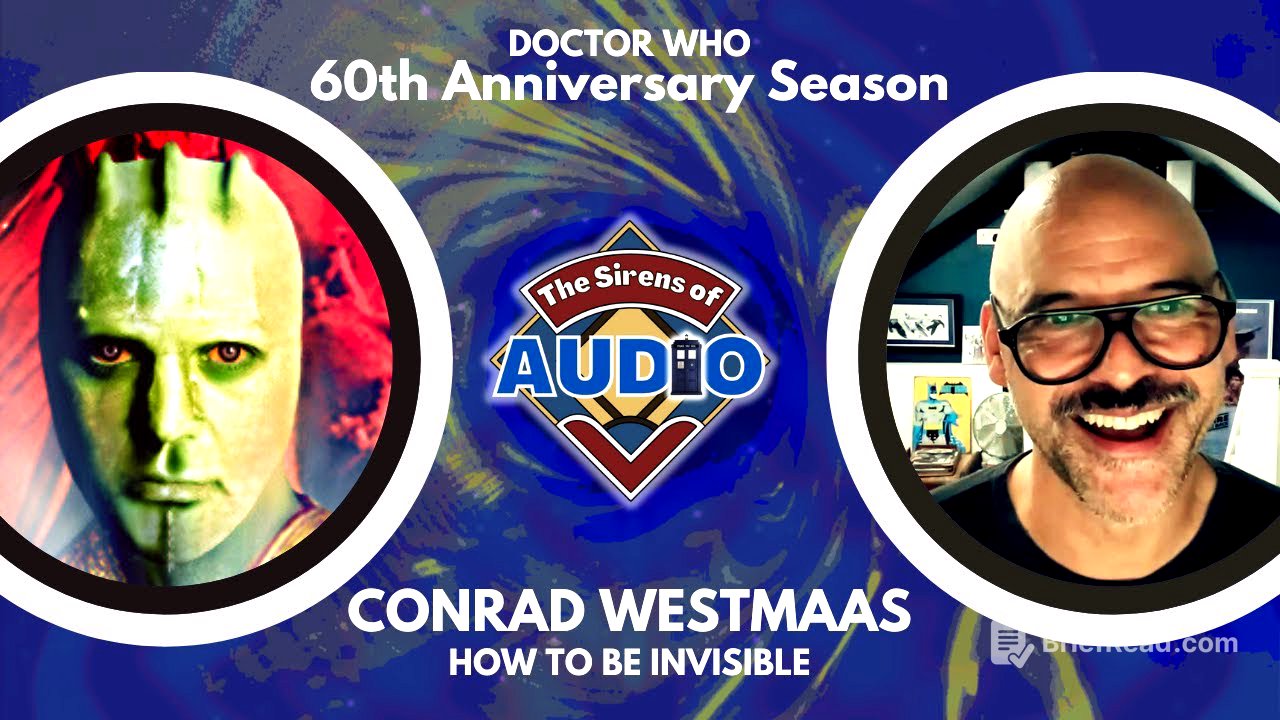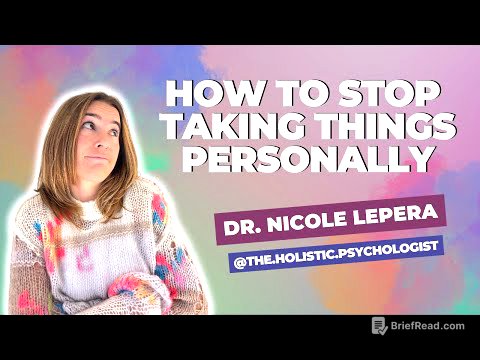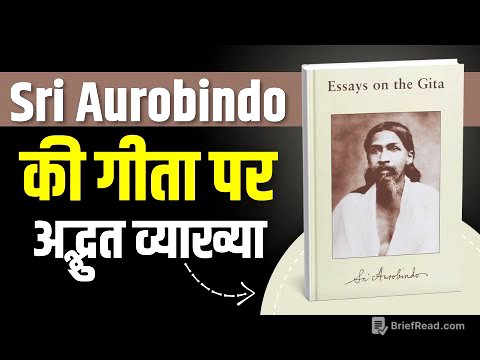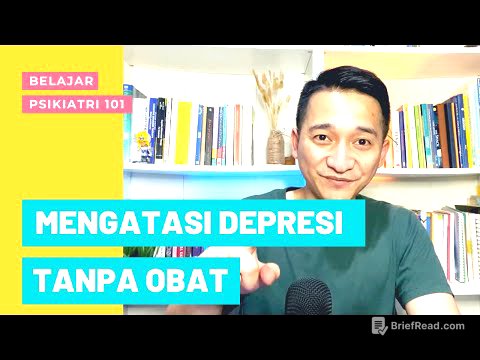TLDR;
This episode of The Sirens of Audio podcast celebrates the 20th anniversary of "The Creed of the Kromon" and the Divergent Universe saga, featuring Conrad Westmaas, who played the companion C'rizz alongside the Eighth Doctor. The discussion explores Westmaas's journey into Doctor Who, his experiences as a companion, and the fan reactions to the Divergent Universe series. The hosts and Westmaas discuss the qualities of a perfect companion, the challenges and rewards of working on Doctor Who audio dramas, and the impact of the series on fans.
- Qualities of a perfect Doctor Who companion include trust, confidence, inquisitiveness, and adaptability.
- The Divergent Universe saga was an experimental era that polarized fans.
- Despite mixed reactions, being part of Doctor Who has had a lasting positive impact on Conrad Westmaas.
Intro [0:00]
John Dorney introduces the sounds of audio podcast, hinting at an investigation into creatures from the Divergent Universe.
Podcast Introduction [0:57]
Dwayne and Philip introduce The Sirens of Audio, a show dedicated to exploring the Doctor Who universe in audio format. They announce that upcoming episodes will be themed around the 60th anniversary. They are joined by Conrad Westmaas, the star of "The Creed of the Kromon," to discuss the 20th anniversary of the Divergent Universe saga.
Conrad's History with Doctor Who [3:59]
Conrad Westmaas shares his lifelong love for Doctor Who, recalling his earliest memory of the Sea Devils and his ongoing passion for the series. He discusses his early exposure to the show through his sister and his enduring fondness for classic Doctor Who stories.
What Makes the Perfect Doctor Who Companion? [5:41]
Philip and Conrad discuss the qualities of a perfect Doctor Who companion. Philip suggests that the ideal companion has evolved over time, citing Barbara Wright as the original perfect companion due to her audience perspective, skepticism, and caring nature. He also praises Rose Tyler for her ability to stand up to the Doctor. Conrad adds flexibility and adaptability as essential qualities, emphasizing the importance of understanding when to support the Doctor and when to challenge them. They touch on various companions, including Sarah Jane Smith, Joe Grant, and Evelyn Smythe, highlighting the different dynamics each brought to the show.
Rabbit Hole Exit and Conrad's Early Life [19:36]
After a brief trailer for "The Creed of the Kromon," the hosts transition to discussing Conrad Westmaas's early life. Conrad describes his happy childhood in Wells, England, and the significant role that Doctor Who, Star Wars, and Batman played in his formative years. He reflects on his strong connection to his fantasy life and how it influenced his later creative endeavors.
Becoming an Actor and Musical Influences [23:42]
Conrad recounts his early experiences with acting, starting with a school play where he was unexpectedly cast in the lead role. He credits his influential drama teacher, Mr. Wilde, for instilling discipline and professionalism in his approach to acting. Conrad also discusses his musical tastes, noting that his favorite program, film, and music have remained consistent since childhood: Doctor Who, Star Wars, and Kate Bush.
Sexuality and Career Choices [27:35]
Conrad discusses his understanding of his sexuality from a young age and how it influenced his love for Doctor Who and theater. He suggests that queer people often have a heightened sense of spotting what's real behind artificial constructs, which draws them to artistic and creative pursuits. He also shares his experiences of growing up gay in the 1980s and the challenges of coming out during the AIDS crisis.
From 20th Century Fox to Drama School [33:48]
Conrad recounts his unexpected journey from working at 20th Century Fox to attending drama school. He describes his disillusionment with the corporate environment and his decision to pursue his passion for acting. He details his experiences at drama school, emphasizing the strict discipline and the challenges of starting a new career in his early 30s.
Early Acting Career and Joining Big Finish [39:54]
Conrad discusses his early acting career, including touring with "Abigail's Party" and performing Shakespeare. He explains how he got involved with Big Finish through his work at Doctor Who Magazine and a chance encounter that led to his role in the Peter Davison audio drama "Omega". He describes his excitement at being part of Doctor Who and his dedication to making the most of the opportunity.
Becoming C'rizz [46:36]
Conrad recounts how he was offered the role of C'rizz, a new male companion for the Eighth Doctor, shortly after his first Big Finish appearance. He shares his initial impressions of India Fisher and Paul McGann and the unique challenges of joining an established dynamic. He also discusses the experimental nature of the Divergent Universe saga and the lack of clear direction for his character.
Natural History of Fear and Creed of the Kromon [50:38]
The conversation shifts to specific stories, starting with "The Natural History of Fear," where Conrad, Paul, and India play multiple characters. Conrad describes the disorienting experience of recording the play and praises Sean Carlson's performance. He then discusses "The Creed of the Kromon," noting its challenging script and the contradictory information about his character.
Fan Reaction to the Divergent Universe [1:00:11]
Conrad opens up about the fan reaction to the Divergent Universe saga and his character, C'rizz. He acknowledges the criticism and admits that it was hurtful, but also highlights the positive feedback he received from some fans. The hosts discuss how the announcement of the new Doctor Who series influenced the reception of the audio dramas and the challenges of introducing a new companion in an experimental era.
Challenges and Favorite Stories [1:06:46]
Conrad reflects on the challenges of making C'rizz work as a character and the rocky start to his time on Big Finish. He notes that he, Paul, and India found their rhythm over time, particularly in the funnier stories. He reveals that "Faith Stealer" is his favorite story from his time on Doctor Who, praising its humor and the performances of the cast.
Working with Paul McGann and the Divergent Universe [1:11:44]
Conrad discusses his working relationship with Paul McGann, noting the initial uncertainty and the eventual development of a strong rapport. He also addresses the complexities of the Divergent Universe and the challenges of understanding its concept. He defends Big Finish's right to experiment and acknowledges the mixed reception to the Divergent Universe saga.
The End of the Divergent Universe and Meeting Paul Darrow [1:17:41]
Conrad recalls the feeling that the Divergent Universe saga was coming to an end with the return of the Doctor Who TV series. He shares a story about visiting the set of the new series and nicking a Rose Tyler missing poster as a souvenir. He also expresses his excitement about working with Paul Darrow, who played his father in "The Next Life."
Post-Divergent Universe Stories and Reflections [1:25:38]
Conrad discusses the release of post-Divergent Universe stories and how it allowed him to balance his theater work with his Doctor Who commitments. He mentions "Terra Firma" and "Other Lives" as two of his favorite stories from this period. He also reflects on the challenges of finding situations for C'rizz to fit into as an alien character.
Humor, Experimental Writers, and Arthur Bostrom [1:31:40]
Conrad emphasizes the importance of humor in drama and reflects on the experimental writers who worked on the Doctor Who audio dramas. He shares his memories of working with Arthur Bostrom on "Scaredy Cat."
Wrapping Up C'rizz's Story [1:34:39]
Conrad discusses Nick Briggs taking over as producer and the decision to wrap up C'rizz's story. He expresses his gratitude for the opportunity to provide closure to the character's arc. He also shares anecdotes about recording in Bristol and Brixton and selling his scripts at conventions.
The Impact of Doctor Who [1:38:35]
Conrad reflects on the lasting impact of Doctor Who and the personal connections fans have with the series. He shares a touching story about a fan who said that the Doctor Who audio dramas helped him through a difficult time. He acknowledges the unique experience he, Paul McGann, and India Fisher shared and the enduring legacy of their work.
Recommendations [1:43:28]
Philip recommends "The Natural History of Fear," praising its experimental nature and powerful conclusion. Conrad shares his top five Doctor Who podcasts and recommends the Robin of Sherwood audio dramas. Dwayne recommends "Other Lives," highlighting its dark elements and humor.
Outro [1:48:42]
The hosts thank Conrad for joining them and wrap up the episode, providing information on how to contact the show and listen to future episodes.









